The Neglected Whole:
Or, Never
Heard of You -- Part II
by Elizabeth Rigel
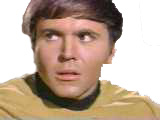 |
Pavel Chekov
first appeared among the Bridge crew of the Enterprise in
Star Trek's second season. The Star Trek
Guide outlined Chekov as "reliable and dependable,
with a good head on his shoulders in spite of his
youth." He was one of the few minor characters given
adequate (if not overwhelming) screen time to live up to
his description, surviving despite the rigors of
Starfleet and fickle television rating systems. |
Chekov was born to a middle-class family near
Moscow and is an only child ("Day of the Dove"). He has
apparently always been their "nice boy," the one who
still cries after receiving his mother's proud letters and
fruitcakes. Thus he was well prepared to assume the pecking-order
position (vacated by fellow youngster Janice Rand) of "the
Bridge baby." He bears the common burden of youth: no
respect. He lacks maturity, so he will be made better by being
watched, bothered, and left behind. He has talent but is too
green to understand it. If he does a job right, another person
receives credit. And if he does something wrong...
| He is introduced in "Amok
Time," but his earliest filmed episode was "Who
Mourns for Adonais." And according to Khan Noonian
Singh, Chekov was around as early as "Space
Seed." This identification must be accurate. The
Enterprise was alone in 'Space Seed," and no ship
visited Ceti Alpha V thereafter. Chekov was indeed aboard
the Enterprise at that time or they never would have met.
Chekov was already twenty-two by the time of "Who
Mourns For Adonais?", so he could have graduated
from the Academy early. |
 |
However, raw genius alone cannot earn a
starting position on Kirk's "crisis bridge" team. Kirk
requires additional on-the-job training for rookies and
transfers, which is why he has the finest ships in the fleet. He
required it of Sulu and Uhura sometime between "Where No Man
has Gone Before" and "The Man Trap." For everyday
duties such as navigation, the training period is brief. But
Chekov has been personally groomed by Spock to be the backup
Science Officer. Because Spock is the best Science Officer in the
fleet, it is entirely reasonable that it took Chekov a year of
training (In one of the two (eight-hour) or three (six-hour)
off-shifts on the Bridge) before he was allowed to relieve Spock
of the position. In an emergency he would be in charge of
auxiliary control. He was also never seen off-duty because he was
up to his eyeballs in "homework." (Obviously, Spock
learned his teaching methods from his mother.)
There's no question Pavel learned his lessons
well. As Kirk said in "The Ultimate Computer,"
"Chekov could do his job with his eyes closed." There
are days when Spock is not even missed. Chekov adopted the
science duties with complete confidence in "Catspaw,"
"The Immunity Syndrome," "Friday's Child,"
and 'The Enterprise Incident," to name just a few.
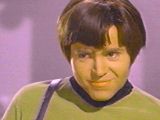 |
He is equally skilled on ground
assignment, as in "Who Mourns For Adonais?"
This show in particular emphasizes Chekov's logic and
talent. (He didn't scream, either.) First, he made the
connection between Apollo and his mechanical energy
source. Second, he volunteered himself into danger to
protect his superiors. Third, his task was complicated by
the fact that no one, especially Scotty, did anything
useful. |
And fourth, Chekov was probably scared to
death. Apollo had threatened several times to kill the landing
party. (And the crew. as well; the ship could not be contacted,
so how could anyone know he had not already done so?) Until the
final commercial, it looked like Chekov was on his own - he would
have to destroy Apollo himself. Now, logically, the expendable
ensign should have been the one to bear the brunt of Apollo's
anger. Chekov tried to point this out to Kirk, and encountered
Kirk's actual modus operandi: "If I don't do it, it isn't
done right." The captain is willing to die to prove his
point. So although Chekov was presented well in "Who
Mourns?", it is a shame that he looked so good only because
everyone else did so badly.
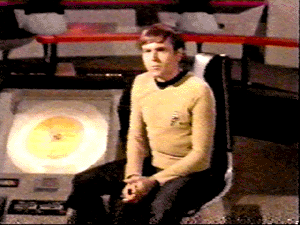 |
Although Chekov was never intended to
make his screen debut in "Amok Time," the
episode is an indication of things to come. One of his
first lines is the eloquent, "I think I'm going to
get spacesick." Don't doubt it - Chekov is forever
falling victim to the malice of man and nature. He is
first to become ill in "The Immunity Syndrome,"
"The Tholian Web," and "Day of the
Dove." A particularly painful moment is the
bewildered, trusting expression on his face just before
the coldhearted Kelvans evaporate him into a teething
toy. |
| It has been truthfully said that if
McCoy is loose when the action starts moving, he is going
to get clobbered. But it's even worse for Chekov, who is
frankly expendable in story terms, regardless of how
popular he became. Now and then a writer may generously
nail both of them, as in "The Deadly Years."
(Chekov was spared from deadly radiation so that McCoy
could pull him into taffy in Sickbay, instead.) This is
not the only similarity between Chekov and a major
character. His struggling imitation of Spock is obvious.
but as a person he is much like his other heroes, McCoy
and Kirk. |
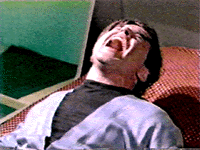 |
McCoy has been called the embodiment of that
chaotic element, emotion. Chekov is even more emotional; his
spirit is young and not yet very organized. McCoy has the
advantage of maturity and a stable career, plus self-control
which, admittedly, he doesn't always use. He has come to an age
and viewpoint that enable him to channel emotions to definite
goals.
Chekov cannot do even this much; and the only
thing he's learned so far is that when he acts like Dr. McCoy,
either the enemy or the boss whales the tar out of him. Maybe
McCoy torments Chekov, not because he objects to his exposure to
Spock, but because he reminds the doctor of himself in younger
days.
The education of the ensign must be an
interesting hobby for his stern tutor, Spock. When Chekov is
feeling logical, he drives even McCoy nuts. Yet Chekov is
hopelessly emotional, by Vulcan standards a lost cause. It must
please Spock no end that someone even worse off than McCoy is
being successfully "rehabilitated."
In the long run, though, Pavel is much more
like Jim Kirk. They share a particularly fascinating problem: a
powerful love/ hate relationship with authority and The Job.
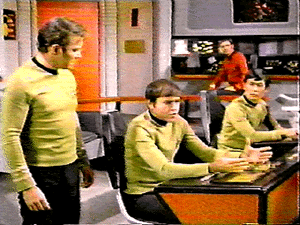 |
Kirk's contempt for Headquarters and
Federation bureaucrats is well known. When he encounters
an alien race, he educates them until they suit him. He
takes badly to a power that proves stronger and/or more
ethical than he is. Kirk must be in charge; he craves
power, and with a starship at his command, he usually
gets it. This is when he loves his job. But there are
days when things do not go his way. Perhaps he has orders
he does not want, or his friends are mad at him for doing
something stupid. Some nights he lies awake hating the
long hours and missing the loving women and happy homes
he's thrown away. At such times, he hates his job. He
does not quite know how to solve his problem, but when
presented with a solution, he cannot go through with it. |
| Apply this to Ensign Chekov. Pavel is
proud to have an envied posting on the heroic Enterprise.
The work is stimulating, his folks adore him, outer space
is breathtaking, and the people are the best. At times he
feels the invincible, "what, me worry?" life is
upon him ("The Apple," "Friday's
Child"). He enjoys the company of Sulu the gossip
and Uhura the big spender. And Chekov's favorite
commander has got to be Scotty. Scotty is a party on leg
- for instance, he starts bar fights with Klingons. But
the best thing about Scotty is that he lets Chekov work
in peace. He doesn't do babysitting. If Kirk lets Chekov
on his Bridge, the fellow must know his job. Scotty
(gasp!) respects Chekov. So do Uhura and Sulu. Their
support is his only comfort. |
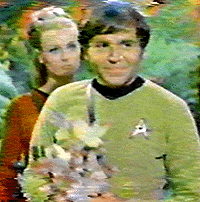 |
However, a disturbing thought must occasionally
cross his mind: Is it better to be highly regarded on a mediocre
cruiser led by nobodies, or to just be nobody on the Enterprise?
Is "just being there" worth all the
baiting and condescension? What reward has he gotten so far for
his hard work? He is afraid of the kind of "blood
brother" friendship that Kirk has with Spock and McCoy, so
he doesn't open up to anyone. Oh, Uhura and Sulu seem to like
him, but they probably just feel sorry for him. He is, after all,
their inferior. Kirk and Spock have told him so. Everyone he
works with is in the chain of command - how important could the
pressures on a mere ensign be? If Uhura is as calm as Spock and
Sulu never takes that blasted grin off his face, then what could
his "friends" know about loneliness? He is frankly
afraid of them. Even the temporary help, like DeSalle of
"Catspaw," treat Chekov as if all he really needs is a
bottle and a diaper. As for Kirk or Spock, Chekov seems resigned
to his belief that he will never please them, and resigned to
their belief that they are doing him a favor by teaching him
patience. He bottles up his feelings too often, hoping to please
them, but he ends up hating them and himself. He can't even
attract female companions, with the dubious exceptions of yeomen,
security, or some alien's leftovers. Is it any wonder he fights
Spock ("The Tholian Web"), Kirk ("The Children
Shall Lead"), and the Klingons (any opportunity) so
fervently?
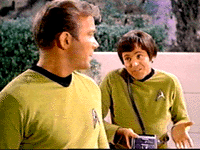 |
An excellent example of the contrary
Kirk/Chekov relationship can be seen in "The Trouble
With Tribbles." After a minor error draws a lecture,
the friendly captain informs the ensign that his memory
stinks. ("Ivan Burkov/John Burke" obviously
was, like "Jeanne d'Arc/Joan of Arc," common in
American text-books, a convenience of the Russian
translator, and no excuse for Kirk's bad manners.) Later,
when the Klingons insult Kirk, Chekov is the first (and
only) one who defends him. Scotty holds back because Kirk
isn't worth the trouble. But when the captain lines up
the transgressors, he first blames loyal old Pavel for
starting the fight. Nice guy, huh? |
| "The Gamesters of
Triskelion" were obviously aware of Chekov's
suppressed anger. If they could tap and channel that
aggression, they could have a truly brilliant gladiator,
one who might even defeat Kirk someday. They selected him
out of a crew of 430 capable crewmembers, gave him a
woman of his very own, and severely punished his
uncooperative boss. If Chekov really hates the service,
this should have been enough to win him over. |
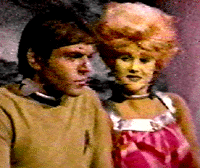 |
It is not. The military may stink, but it does
issue paychecks, promotions, and doors that lock from the inside.
One of the reasons Kirk seems to like Chekov so is that the
ensign has a short memory. They decide to escape.
Chekov has an amusing relationship with his
woman, Tamoon. She seems a nice enough young gladiator, but she's
not his type. He does not like her any more than he does
captivity, but he doesn't take it out on her. He never lied to
her, and he made a point of politely tying her up during his
escape attempt. (Kirk, however, cracked Shahna's jaw.) Chekov
also didn't care for Sylvia ("Spectre of the Gun"), but
he defended her to the death. it is Chekov, not Kirk, who
"doesn't go around beating up beautiful women." True,
Chekov isn't much exposed to beautiful women. But he will defend
himself.
This incident was still not enough to resolve
his love/hate problem with authority. By the time of "The
Children Shall Lead," it was once again volatile enough to
become dangerous. This "beast" was ideal for Gorgan's
plans, which require getting rid of the meddlesome Kirk and
Spock. Chekov has heard from Starfleet Command, he says, and the
Captain and First Officer are to be arrested. It is something he
has always fantasized about doing. If only, just this once, he
could g et back at them! Never again would he feel inferior or
intimidated; now someone would respect his abilities and needs.
To his credit, Chekov admits that he does not wish to kill them,
although he will if he must. If anyone on the Enterprise has the
capacity to kill Kirk. it would be Chekov - and Gorgan, who has
killed before, would send the most dangerous person for the job.
However, Kirk saw that even then Chekov was not controlled deeply
enough to succeed, and he was able to stop him.
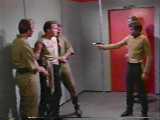 |
It is ironic that Kirk has assembled
the best crew in the fleet by giving no more than a pat
on the head for effort. He has been warned by now that
the natives are restless, and it is surprising that he
hasn't done something about it. Chekov has once again
made clear that he wants better, and again he is ignored.
Compare this with the ambition of Chekov-2 ("Mirror,
Mirror"), who wanted a raise so badly that he would
kill Kirk to get it (From what we saw of Kirk-2, we
almost hope he got it.) |
Probably Chekov's most controversial role was
in "The Way to Eden." Fans complained vigorously that
their teeny-bopper hero has turned into just another stuffy
military man. Pavel was supposed to attract young viewers - in
this show he sounded like their parents. True, this is not how
Pavel Chekov was first introduced, but that is because he has
outgrown the description. He is entirely the Chekov we have
recently seen.
Pavel originally loved his job. No doubt his
family did, too. For all we know, it may have been their idea.
But because Chekov was the one who had to live with it, the
starry-eyed idealism finally faded. He discovered that the
outwardly glamorous Enterprise was a real drudge factory. His
bosses (and many crewmembers have only one) proved to be
perfectionists and workaholics. They did not understand why he
did not share their passion for solving problems or "work as
play." The conflict developed and he did not, could not,
solve it. On top of all this, he had served only three years.
There was no legal way to get out of the military. He is
wondering whether he has made a mistake.
| Into this troubled scene strolls a
serene soul named Irina, an Important Person from his
past. He had broken off their relationship when she
dropped out of the Academy to become a swinging hippie.
He did want to continue the relationship, but on his own
terms. Pavel Andreivich Chekov would never be associated
with a hippie, no matter how much the free life-style
might appeal to him. His common sense (or traditional
pressures) won out, and he was convinced of his own
correct position, all the way through Starfleet Academy. |
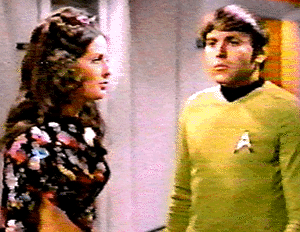 |
Pavel used the same arguments on her that his
parents would have used on him: The work ethic (industriousness.
loyalty, paying taxes for services) is a good thing. If she would
not work, she would starve. On a primitive planet, she would have
little medical care. She would find the morals of the hippies
degenerate, their goals selfish and shortsighted. He knew that he
could not bear to see her inevitable final decline, such as
befall the dregs of society. Instead, he would go forth into the
galaxy and become a hero.
Imagine how Chekov felt when Irina met him
again on the Enterprise. His dire warnings have come to nothing.
All his emotions come crashing down on him: envy for her simple
life, and her happiness. Shame, that he was afraid to follow.
Anger, that she makes her living by sponging and stealing from
people like Chekov who earn their bread. But above all, pride. He
was wrong. He would like to escape this crushing career and make
peace with her. But not on his life would he admit it.
He feels cheated. He has done everything he was
supposed to do, and it doesn't work. It is all garbage.
However, Irina too has changed. She did not
accept his word as a friend that he would find her Eden because
he was no longer a friend. He loathed it, and it humiliated him,
but he tried. She responded to his assistance by taking over the
ship. She gave the Enterprise and the lives of her crew into the
hands of a thief, a lunatic, and an attempted murderer. Irina
knew fully well what she was doing, and what her unstable leader
would do. Well, Chekov may have been wrong about her the first
time, but he was right in the long run.
He does choose to bid her farewell. He can now
distinguish between Irina and her life-style, though he hopes she
will practice it legally. And he has learned that environment
alone does not make a person err, but the choices he makes do, as
well. It's no different from the understanding that Kirk is
temperamental because he chooses to be, not because he's Irish.
 |
"The Way to Eden" was
crucial to Chekov's self-esteem and the solution to his
problem. He is no longer on the Enterprise because he
"should" be there, but because he wants to be
there. He is still young, but he has grown up. |
By the time of Star Trek: The Motion
Picture. Chekov has become a lieutenant (note that Kirk was
not there) and secured an additional post as weapons officer. And
in Star Trek II: The Wrath of Khan. he is a full
commander on the Reliant, all ready to assume the "Jim Kirk
School of Strategic Thought." Of course, Captain Terrell and
Commander Chekov are the ones to beam down on a routine survey to
be caught by Khan. It would seem that after Chekov's eyewitness
observations of what happens to valuable Enterprise personnel who
beam down into danger, he would never leave any ship again. Some
things never change: Chekov being tortured and screaming himself
blue; Chekov being in a position to blow Kirk's rear end off and
then somehow not doing it. Even under Khan's influence, Chekov
refused to harm Kirk; Terrell's will was not as strong, so he
killed himself. Pavel never lost his weapon or was attacked, so
nothing could have prevented him from killing Kirk. But Chekov
still had his will, and he simply would not do it.
 |
(It would be interesting to see how
Chekov would actually in Operations if he had his own
ship. Would he turn cautious? After all these years, it
must have occurred to him that the "Jim Kirk
School" does not have many living followers.) |
It is logical that Chekov would so quickly join
the renegade Search for Spock, no questions asked.
Chekov owes as much to Spock as he does to Kirk, and he would
prefer to express his gratitude in the typically silent but
active Vulcan manner. Chekov also respects McCoy, mostly because
Spock did. Pavel and the doctor never did get along very well on
their own; both thought Spock had some bad effect on the other.
As the reviewers in Best of Trek #8 pointed out, (1)
Chekov does not need reason to do the right thing, so long as
there is a right thing needing to be done, and (2) the man is
sick. He should be home in bed. The Ceti Eel supposedly derives
nutrition as a parasite so either his poor brain was starved for
food and air, or it was just chewed a bit. If McCoy had been the
least bit well, he would never have let Chekov run loose, but he
must have believed he could call the commander back to Sickbay
later. No question, Chekov did not need the extra aggravation.
| It was up to Chekov and Scotty to
almost recreate a battered big ship. Their talents were
less emphasized, and far more important, than any other
effort in The Search for Spock. After all, you
can't exactly walk to Genesis. Everything else done,
although important, cannot be considered to be in the
same league. As Star Trek proved countless
times, Kirk can bust out of jail anytime. Characters are
invincible and immortal. Ships are honest to their nature
and break down. Ships die. |
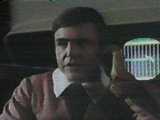 |
Chekov is in a delicate position, though, one
that may be to Kirk's advantage in the fourth film. Unlike Scotty
and Uhura, Chekov was not on duty when they left for Genesis. And
unlike Kirk and Sulu, Chekov got onto the Enterprise early and
undetected. This means that no one saw Chekov leave Earth and/or
go to Genesis, therefore no one can charge him with anything.
Legally, that is. And only Saavik and the Vulcans of Mount Seleya
know how he got to Vulcan.
Can the Federation convict him of conspiracy on
circumstantial evidence? It isn't impossible - McCoy was being
sent to an asylum without so much as a hearing - but just this
once he might get away with it. Kirk may badly need a spy in high
places in the months to come. (Of course, there's always Saavik,
but she has not learned to keep her mouth shut; her honesty could
put him away.) However, Chekov does stand a better chance of
being acquitted than Uhura does. Too many fans are making the
assumption that "Mr. Adventure" will keep his
big mouth shut.
 |
One more thing: Consider poor Pavel's
clothes. "Buster Brown," they've been called
(although in 1985 his stirrup slacks mysteriously came
into fashion among junior high students). Chekov may not
be quite as flamboyant as Kirk, but it is generally
believed that the man does have taste. Obviously he was
dressed blandly in order to ditch Petty Federation
Officials in Charge Of Two-Month Debriefings and the
everloving Federation Enquirer. So don't shoot anyone in
Wardrobe, unless it happens again. Chekov may look good
in Klingon armor. |

This page was
created by

on January 23,
1998
and last updated
Monday, January 26, 1998
Email comments
to: [email protected]















